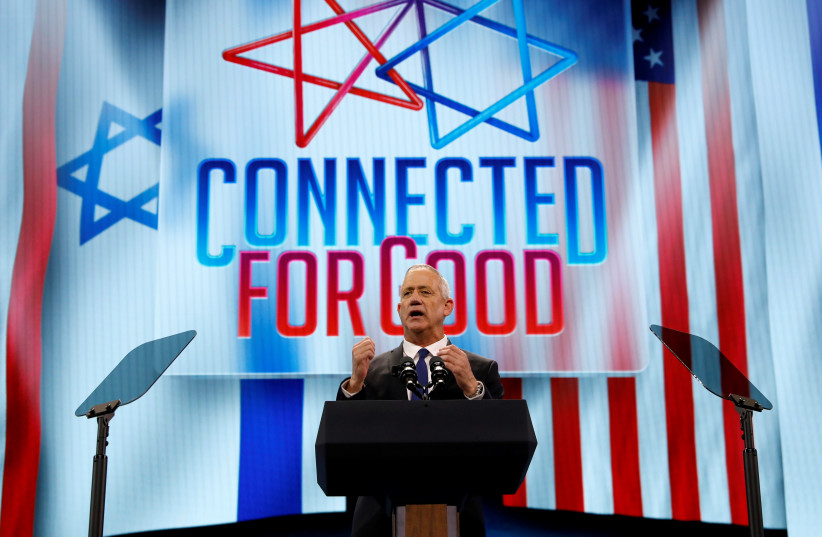Last year, AIPAC, the powerful pro-Israel lobby group, surprised political observers when it announced the establishment of two new PACs that would allow it to directly fund political campaigns.
It was a major shift for the storied organization that until now had refrained from directly supporting specific politicians in order to try and retain the delicate balance of bipartisan support for Israel.
As anyone who has attended an AIPAC event, bipartisanship was always considered something of a holy word based on the premise that the pendulum always swings back and forth in order to ensure that continuous administrations will support Israel. It needs to make sure that both Republicans and Democrats grow an attachment to the Jewish state in the Middle East.
That seemed to be ending in December when the new PACs got to work ahead of the upcoming midterms. The pinnacle of this test took place last week in Michigan’s 11th district, where two Democratic incumbents ran against each other after the state lost a seat in the last census and the map had been redrawn.
Stevens vs. Levin
AIPAC PAC contributed $5,000 and $676,924 in direct contributions to Rep. Haley Stevens through its portal, and an additional $4.2 million through United Democracy Project, an AIPAC-linked super-PAC.

On the other side, was the J Street Action Fund, which according to vice president of communications Logan Bayroff, spent more than $700,000 to help reelect Rep. Andy Levin. More than $300,000 was directly contributed to his campaign via J Street PAC.
While the two groups had already backed candidates who ran against each other in this election, the race between moderate Stevens and progressive Levin became the center of attention and led to a contentious race between AIPAC and J Street, which traded barbs and condemned each other’s tactics.
Stevens was seen as the pro-Israel candidate, while Levin was seen as being overly critical of Israel. He tried to push back on this claim, asserting that as a former synagogue president it did not make sense for a Jewish group to campaign against him.
Levin intimated as much in an interview late last month with MSNBC’s Mehdi Hasan, who is himself hyper-critical of Israel.
“You are Jewish,” Hasan said to Levin. “Why is a pro-Israel lobby group using a super PAC, dark money, to try and defeat you in a Democratic primary,” he asked using a somewhat incredulous tone.
“Why is a pro-Israel lobby group using a super PAC, dark money, to try and defeat you in a Democratic primary.”
Mehdi Hasan
“I’m not just Jewish, Mehdi,” Levin said. “I’m one of two former synagogue presidents in Congress … I’ve got mezuzot on all my doors. I’m really Jewish.”
Levin has now lost and, as expected, J Street, as well as the congressman’s supporters, are rallying against AIPAC.
AIPAC’s decision to enter the fray of partisan politics will come at a price. Supporting some candidates over others will make it harder to keep both sides of the aisle happy. On the other hand, the situation in American politics today does not allow it to remain neutral as in the past.
“The DC political environment has been undergoing profound change,” AIPAC president Betsy Korn wrote in a letter when announcing the establishment of the PACs last December. “Hyper-partisanship, high congressional turnover, and the exponential growth in the cost of campaigns now dominate the landscape. As such, the Board has decided to introduce these two new [PACs].”
For AIPAC, the Stevens-Levin race was critical. It showed that when tested, the lobby group knows how to mobilize and can garner financial support for a candidate it believes in and trusts will help advance the cause – the State of Israel - it was created to safeguard.
“By demonstrating its ability to help elect ‘pro-Israel’ congressional candidates and defeat those whom it considers being too critical of Israel, AIPAC will certainly retain, if not enhance, its influence in Washington, and among Democrats in Congress in particular,” explained Prof. Dov Waxman, director of the UCLA Y&S Nazarian Center for Israel Studies.
For now, AIPAC has a big victory under its belt but the real test will be one over time. AIPAC has proven that its PACs are a force to be reckoned with. Time will tell whether this will increase
